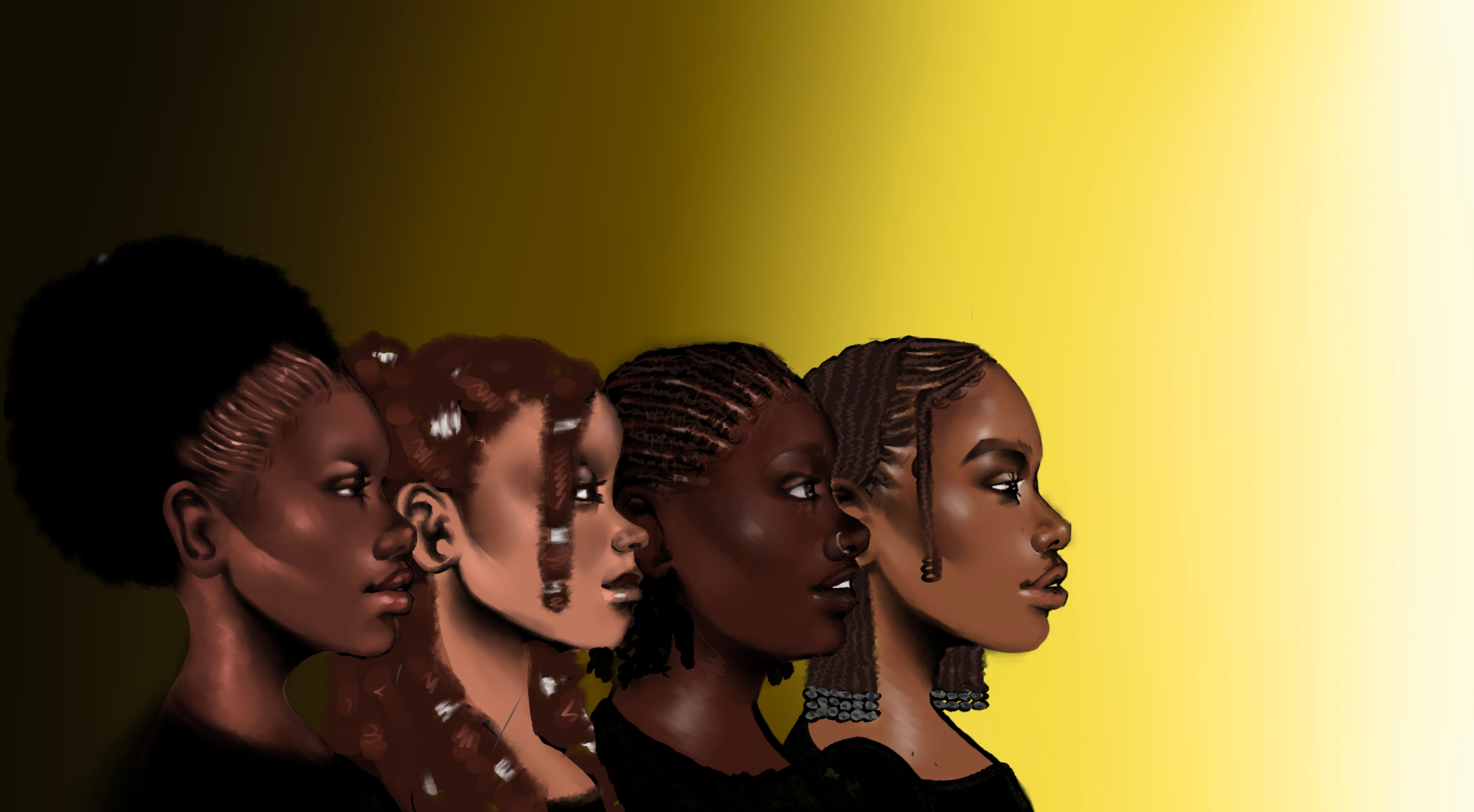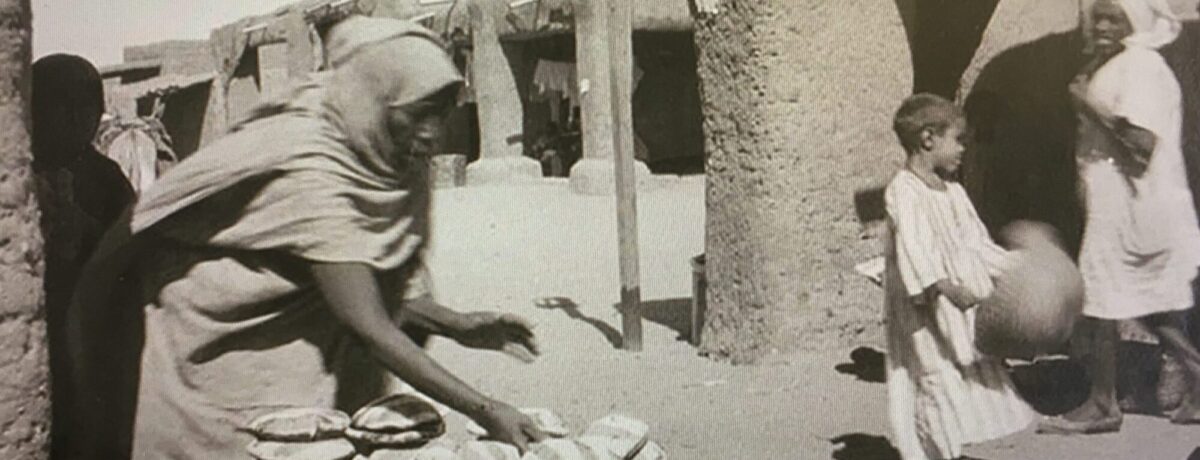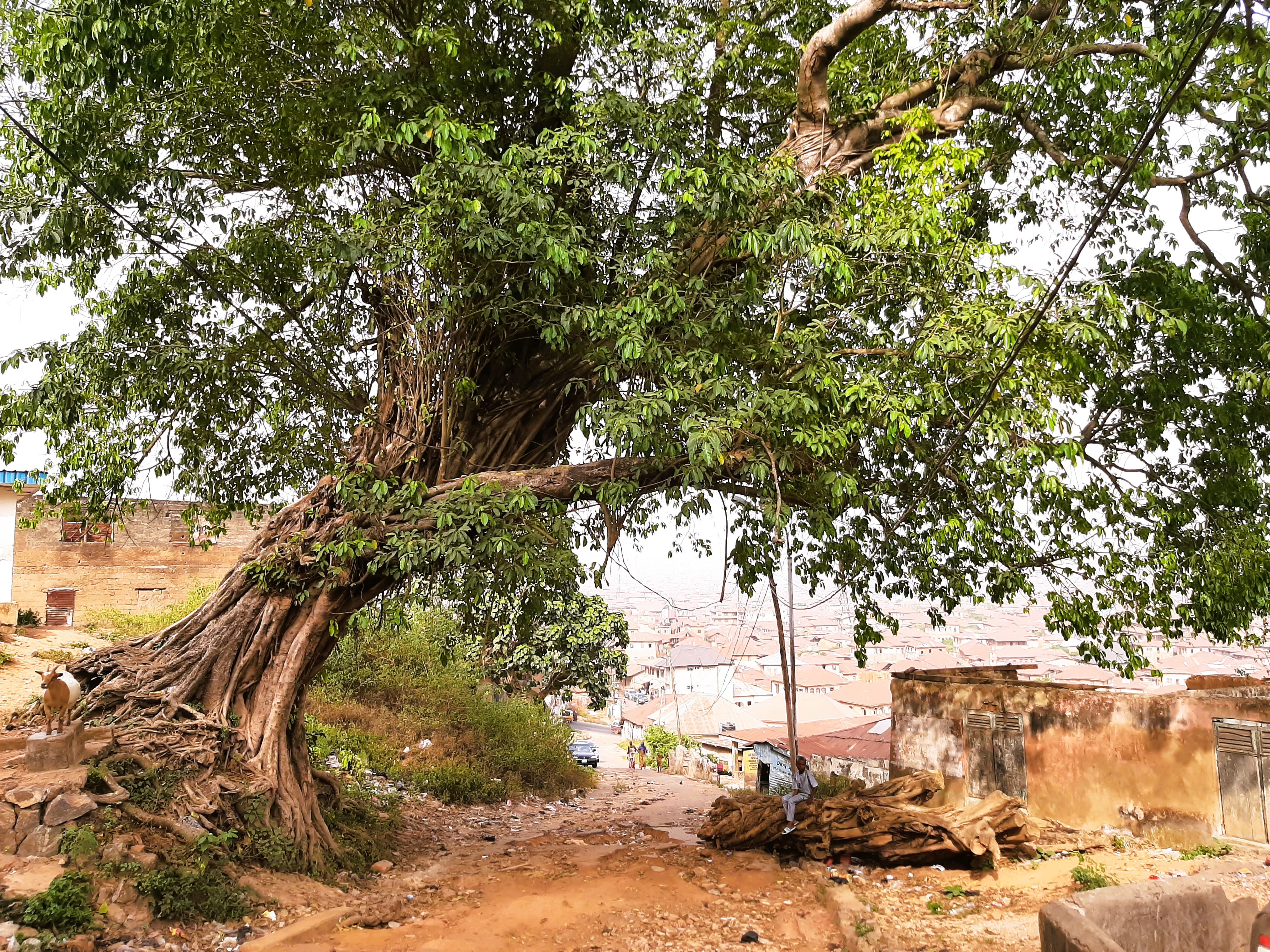In 2022, the Embassy of France in Nigeria and IFRA-Nigeria have been awarded funding to support efforts by Nigerian researchers and professionals, from partnered institutions, to develop their ideas and projects on the conservation of Nigerian Heritage and Patrimony.

From left to right: Dr. Sa'eed Husaini, researcher at the Centre for Democracy and Development (CDD), Dr. Sola Olorunyomi, associate professor at the University of Ibadan,
In 2022, the Embassy of France in Nigeria and IFRA-Nigeria have been awarded funding to support efforts by Nigerian researchers and professionals, from partnered institutions, to develop their ideas and projects on the conservation of Nigerian Heritage and Patrimony.
The objective of this project is to put digital technologies, as well as French and Nigerian expertise, at the service of the protection, enhancement, and dissemination of Nigerian heritage processes to different local and global communities. In practice, it is a response to the growing challenges in the world of research of Nigerian cultural and heritage studies with the objective to improve the protection, conservation, dissemination, and training about heritage and develop sustainable capacity in this area.
The Solidarity Fund for Innovative Projects (FSPI) is a program run by the French Ministry of Europe and Foreign Affairs designed to help French institutions abroad carry out research-action activities in the country where they work, in close collaboration with local stakeholders.
In this FSPI project, IFRA-Nigeria will be working with Nigerian partners to
1) Select processes of Nigerian cultural heritage and their conservation,
2) make these heritages more accessible to a wider audience with the help of digital tools,
3) provide training opportunities for a new generations of Nigerian researchers,
with a specific focus on the gender and age of the researcher. At the beginning, the project is made up of five different component projects but with dynamic connectivity in the core objectives of the broader FSPI project.
Objectives of the FSPI project:
- Structuring Franco-Nigerian relations in the sectors of protection, promotion, and dissemination of Nigerian heritage processes.
- Building a fair partnership and collaboration models aimed at co-constructing projects and jointly mobilising French and Nigerian expertise to develop skills.
- Demonstrating the relevance of such an approach through the implementation of projects that are eventually replicable and provide deliverable added value in the medium term.
Five components of the project
- Protecting political activists’ archives to write another history of Nigeria
Objectives:
- Create an inventory and digitise pre-selected archives of professors Bene and Edwin Madunagu in Calabar as well as other activists’ archives.
- Academics and activists will be sponsored to publish research on the digitised archives (as well as the papers of professors? Ola and Kehinde Oni previously digitised by IFRA-Nigeria). Workshops will be organised to disseminate knowledge about the digitised archives.
- Digitising and promoting the documentary collections of the National Museum of Lagos
- Partners: National Commission for Museums and Monuments (Lagos National Museum) & African Artists’ Foundation, Lagos. Coordination: Pedro Taye
Objectives:
- Digitizing and promoting the documentary collections of the National Museum of Lagos, especially the maps and papers of the Museum’s founder Kenneth Murray.
- Training of staff and other heritage specialists.
- Researchers will be hired to work on the digitised collections.
- Partnership with the African Artists’ Foundation to have artists working on and interrogating the digitised collections.
- Final exhibition and event with the artists and researchers.
- Creating a digital archive of the intangible heritage of Benin (Nigeria)
Objectives:
- Creating a digital archive of the intangible heritage of Benin (Nigeria)
- A group of young researchers specializing in Benin Studies will be trained in sound and video recording and the challenges of digitizing intangible heritage during a five-day masterclass at the start of the project
- Elements of Edo’s intangible heritage (songs, ceremonies, rituals) will be collected, annotated, translated, and archived on a dedicated website
- A high-level event will be organized in Benin City and broadcast online to present the digital archive
- Promoting the religious architectural heritage of Ibadan
- Partners: Institute of African Studies & University of Ibadan & others. Coordination: Cell Generation Technology (CGT) & Dr. Cyrielle Maingraud-Martinaud (IFRA-Nigeria)
Objectives:
- Protecting the urban archaeological heritage of Ile-Ife
Objectives:
- Mapping historical pavements of Ile-Ife.
- Training in the preservation of archaeological heritage
- Raising public awareness of the protection of urban archaeological heritage
- Creating interest through open access of the digitised heritage of Ife
- Partnership for the creation of a center of interpretation on one of the sites
IFRA-Nigeria’s Elections Observatory
IFRA-Nigeria intends to play a role in observing and analysing the social impacts of Nigerian policies, polities, and politics in a short- and long-term perspective. In this electoral setting, IFRA launched an observatory overseeing the 2023 elections in Nigeria. The aim is to produce data and analysis from various standpoints on the election process. To further this endeavour, IFRA-Nigeria sponsored and spearheaded several initiatives. A Roundtable on the 2023 Nigerian elections kickstarted this initiative on the 8th of December 2022.
IFRA-Nigeria & IFRI partnerships
IFRA-Nigeria partnered with the Institut Français des Relations Internationales (IFRI) and commissioned a paper to Dr. Sa'eed Husaini, researcher at the Centre for Democracy and Development (CDD) that was published in February 2023. The paper titled “Nigeria’s 2023 Election: Democratic Development and Political Fragmentation” is freely accessible following this link.

On the 16th of March 2023, IFRA-Nigeria, and the French institute of international relations (IFRI) co-organised an online seminar on the Nigerian general elections featuring Dr. Elodie Apard, Research Officer at IRD, Dr. Benjamin Augé, Research Associate at IFRI; Dr. Sa'eed Husaini, Researcher at the Centre for Democracy and Development and Dr. Cyrielle Maingraud-Martinaud, Deputy Director of IFRA-Nigeria. The debate was moderated by Alain Antil, Director of IFRI’s Sub-Saharan Africa Centre. This event reviewed the electoral process and the results of the elections while replacing them in historical dynamics and structural challenges of the country. The recording of this event is available here.

Screenshot of the online conference co-organised by IFRA-Nigeria and IFRI on March 16th, 2023
Ethnographic fieldwork projects
IFRA-Nigeria is funding six young Nigerian researchers to conduct fieldwork-based research upon different topics and to promote new point of views and analytical lenses to understand topical issues in social sciences. These researchers conducted ethnographic fieldwork on various aspects of the electoral events. The research was carried out in several regions and covered issues such as the involvement of women in the electoral process, the violence they suffered and their way to reorganise themselves and answer to violence; the challenges faced by the ad hoc collation agents of the Independent National Electoral Election (INEC), and the nature of elections in a local government bordering Benin.

Adedeji Adebayo (researcher) with Ms. Iyabo Ojo, Ìyál'ọ́jà (chief) of Ikere-Ekiti at her house in Ikere, February 22nd, 2023 – credit: Adedeji Adebayo
Building from research conducted within IFRA-Nigeria elections observatory, the institute hosted a day of roundtables and a keynote lecture by Professor Eghosa Osaghae on June 14th aimed at assessing what happened during this election cycle and what it means for the political and social dynamics of the country.

Professor Eghosa Osaghae at the institute of African studies (University of Ibadan) on June 14th

IFRA-Nigeria staff and five of the six researchers recruited to observe and analyse the election process, June 14th 2023. From left to right: Mr Ikefuama Okechukwu Livingstone, Mrs Elizabeth Njo Obimbua, Dr. Adedeji Adebayo, Mr Lateef Olalekan Aremu, Dr. Barbara Morovich (IFRA-Nigeria director), Dr. Olusapo Olakunle Thompson, Mr Youssef Bouri (Researcher Project manager), Dr. Cyrielle Maingraud-Martinaud (IFRA-Nigeria Deputy director and researcher),
List of researchers and provisional research titles
Dr. Adedeji Adebayo
How much does a vote cost? Politics of inducement in Ikere Local Government Area, Ekiti State, Southwestern Nigeria
Elizabeth Njo Obimbua
Electoral violence and the female gender in Lafia local government area of Nasarawa state
Ikefuama Okechukwu Livingstone
Border spaces: interrogating voting behaviour in Nigeria’s ungoverned spaces
Lateef Olalekan Aremu
Protecting the vulnerable actors: violence during electoral campaigns and participation of women in politics in Ibadan metropolis
Dr. Olusapo Olakunle Thompson
An assessment of the challenges of the independent national electoral election (inec) ad hoc collation officers in the 2023 general elections
Obafemi Seyi Peter
Countering vote-buying with voter education; a field researcher’s account of the 2023 general elections in Egbeda Iga of Oyo state.
Research Project coordinated by:
- Dr. Elodie Apard, Chargée de Recherche, Institut de Recherche pour le Développement (IRD), Unité de Recherches Migrations et Société (URMIS)
- Dr. Precious Diagboya, Senior Research Fellow, Institut Français de Recherche du Nigéria (IFRA-Nigeria)

Original drawing : Ewena Robin
___________________________
Project Description
This project is a continuation of an IFRA research project on the Protection of migrants and Asylum seekers especially Children and women coming from Nigeria and victims of trafficKING (PACKING).
For some years now, human trafficking for sexual exploitation from Nigeria to Europe is grabbing the attention of public institutions and arousing growing media interest. This phenomenon, partly due to its “emotional power” (Jakšić 2013), also triggered abundant scientific production. But even if largely covered by scholars, NGOs and government authorities, such topic remains tricky to analyze, notably because of the potential political exploitation of social and moral issues related to sex trafficking.
The research project “Life after trafficking; transnational perspectives” has been, thus, based on critical distancing and new approaches, in order to develop original forms of data collection, through multi-situated ethnographic fieldwork.
So far, most studies on sex trafficking have adopted one-sided approaches, either from a Nigerian or a European perspective. In Nigeria, analyses often conflate sex trafficking and “irregular” migration, while in Europe, the focus has long been on the legal framework of anti-trafficking policies and the status of victims (Jakšić & Ragaru, 2021, de Montvalon, 2018). Individual trajectories and family histories have been more seldom explored[1]. In addition to family histories, the present project intends to focus on personal experiences at a micro level, but within a transnational continuum that encompasses spaces of departure, transit and arrival.
This collective and multidisciplinary research project follows the previous work on trafficking for sexual exploitation from Nigeria to Europe undertaken by IFRA-Nigeria from 2015 to 2020[2].
The two coordinators of the project are:
- Dr. Precious Diagboya, philosopher by training, has studied the epistemology of slavery before specializing in human trafficking for sexual exploitation. As a native of Edo State, she has excellent knowledge of Benin Culture and History, but also of the social landscape of the region.
- Dr. Elodie Apard, historian by training, has worked and lived in Nigeria for 9 years. She specialized in women international mobility and sex-trafficking when she was the Director of the French Research Institute in Nigeria (IFRA-Nigeria), between 2016 and 2020.
Both of them were part of these preceding research studies; they conducted extensive fieldwork, in France and in Nigeria, and developed a solid expertise in analysing the social, religious, economic and political dynamics that underlie sex-trafficking logics and practices[3].
Context of the Study
During the past decade, sex trafficking from Nigeria to Europe evolved significantly, following a series of events; the so-called “migrant crisis” in 2015-2016, closure of south European countries, externalization of borders and the Covid-19 pandemic in 2020-2021. As a result, the number of people affected, the routes, destinations and trafficking strategies have changed. In 2018, in Nigeria, the declaration of the Oba of Benin, that declared trafficking practices punishable by death, also had a considerable impact on the phenomenon.
Today, while the number of Nigerian women arriving in Europe through trafficking networks has decreased, new major challenges have emerged.
One of them is the integration of these women into the host societies in Western Europe. After experiencing the violence of sexual exploitation, the majority of them suffer from polytrauma. The way the receiving countries acknowledge and address their peculiar situation is crucial to the success of their social integration as well as those of their children.
Another challenge lies in the relationship these women have with their Families in Nigeria. Trafficking often stems from a collective strategy to escape poverty and is seen as a way to sustain the whole household. The nature of the family ties plays a key role in the life of trafficked women in Europe, but also in the transformation of social and family dynamics in Nigeria.
Through multi-situated fieldwork and crossed data, this research project intends to explore post-trafficking issues, both in France and in Nigeria. The idea is not to compare situations in departure and arrival countries but rather to combine different perspectives on what characterizes life after trafficking, at the different levels of the transnational continuum.
Main Goals
By gathering original and fresh first-hand data, this project aims at enhancing empirical knowledge on sex trafficking. It intends to document and analyse the transnational dynamics developing between Nigeria and Europe, among victims of trafficking who are now engaged in an insertion process and with their families.
The results of this research will translate into academic publications (articles in peer-reviewed Journals, book’s chapters) and presentations (papers presented in Conferences, public lectures or seminars).
However, production of scientific knowledge on sex trafficking from Nigeria should not remain limited to scholarly work, therefore, the results of this project will also be disseminated towards actors involved on the ground and stakeholders. Through written reports, public presentations or organising small groups discussions with concerned professionals, researchers will inform a large public on what is at stake in post-trafficking situations.
The project is an action-oriented research project implemented in partnership with MIST association[4] (Mission d’Intervention et de Sensibilisation contre la Traite), in Paris. Founded by Nigerian women victims of sex-trafficking, Mist association is specialised in protecting, sheltering and helping victims through their integration process in France. Based on peer-education, the association also organises support groups, workshops and podcast production, in which the collaboration with researchers has proved to be particularly fruitful. This project shall also be useful to the association and its members; researchers will indeed make data available to victims and will aim at developing new forms of knowledge transmission and alternative forms of writing while promoting collaborative reflection.
Methodology
In the course of the previous research work and ethnographic fieldwork they conducted, the two coordinators of the project realized that different perceptions, depending on researchers’ point of view and positionality, co-exited and needed to be combined. Then, they decided to implement new research approaches, based on the complementarity of a multi-situated analysis.
The two coordinators are based in different countries: Dr. Elodie Apard in France and Dr. Precious Diagboya in Nigeria; but the research tasks do not correspond to this geographical division; both researchers work with former victims of trafficking in their respective countries, follow their integration process in France, engage with social workers and and meet the families in Nigeria, either separately through individual fieldwork conducted in parallel, or together during common field surveys.
The aim of undertaking fieldwork together, alternatively in France and in Nigeria, is to combine different skills (i.e. language and analytical skills) and methodologies, but also different standpoints and perspectives, on the same object, at the same time. This original method allows a broader approach and facilitates the researchers’ reflexivity efforts.
Finally, access to the field, to the victims and their families is facilitated by the researchers’ experience and also by the collaboration with MIST; while researchers take part in the association’s activities, some members of MIST participate in the research process.
Timeframe
The idea of the project started in 2020, with the involvement of the two coordinators in the activities of MIST association and theirs exchanges with members about the challenges of integration in France. The first surveys started in 2021, with a common fieldwork conducted in the Nigerian Churches of Paris Region. Researchers explored the role of the Church in the socialisation and integration processes in France, as well as their connections with trafficking practices. Since 2022, fieldwork has been conducted simultaneously in France and in Nigeria, among members of the same families, to address post-trafficking issues from different perspectives.
Supported by IFRA-Nigeria and URMIS Paris, this research project is expected to develop in the years to come by getting substantial funding and associating more researchers.
[1] Among the few scholars who did explore individual trajectories is Sine Plambech, anthropologist at the Danish Institute for International Studies.
[2] https://www.ifra-nigeria.org/ongoing-research-programs/packing
https://www.ifra-nigeria.org/former-research-programs/human-trafficking
[3] Among the outcomes of their collective work on sex trafficking, see : Apard, Élodie, Precious Diagboya, et Vanessa Simoni. "“Ashawo no Dey Kill!” The social-climbing projects of families in the context of sex trafficking (Nigeria-Europe)", Politique africaine, vol. 159, no. 3, 2020, pp. 51-82., Élodie Apard, Precious Diagboya, et. al. Religious, Social and Criminal Groups in Trafficking of Nigerian Girls and Women. [Research Report], 2019, 179 p. ⟨hal-03337293⟩, Élodie Apard, Precious Diagboya, et. al.,Temples et traite des êtres humains du Nigéria vers l'Europe. [Rapport de recherche], 2019, 77 p. ⟨hal-02124579⟩
[4] http://mist-association.org/














 Pavements measurements, Ita Yemoo, Ile-Ife, July 2022, photo by Zainab Popoola, © Ife-Sungbo Archaeaological Project
Pavements measurements, Ita Yemoo, Ile-Ife, July 2022, photo by Zainab Popoola, © Ife-Sungbo Archaeaological Project



Social Media
Mailing List